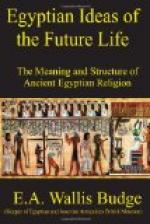of that portion of it in which the sun rises.] therefore
in every place every heart swelleth with joy at thy
rising for ever. The regions of the North and
South come to thee with homage, and send forth,
acclamations at thy rising in the horizon of heaven;
thou illuminest the two lands with rays of turquoise
light. Hail, R[=a], thou who art R[=a]-Harmachis,
thou divine man-child, heir of eternity, self-begotten
and self-born, king of the earth, prince of the
underworld, governor of the regions of Aukert (i.e.
the underworld)! Thou didst come forth, from
the water, thou hast sprung from the god Nu, who
cherisheth thee and ordereth thy members. Hail,
god of life, thou lord of love, all men live when
thou shinest; thou art crowned king of the gods.
The goddess Nut doeth homage unto thee, and the
goddess Ma[=a]t embraceth thee at all times. Those
who are in thy following sing unto thee with joy
and bow down their foreheads to the earth when they
meet thee, thou lord of heaven, thou lord of earth,
thou king of Right and Truth, thou lord of eternity,
thou prince of everlastingness, thou sovereign of
all the gods, thou god of life, thou creator of
eternity, thou maker of heaven, wherein thou art firmly
established. The company of the gods rejoice at
thy rising, the earth is glad when it beholdeth
thy rays; the peoples that have been long dead come
forth with cries of joy to see thy beauties every day.
Thou goest forth each day over heaven and earth,
and art made strong each day by thy mother Nut.
Thou passest through the heights of heaven, thy
heart swelleth with joy; the abyss of the sky is content
thereat. The Serpent-fiend hath fallen, his
arms are hewn off, and the knife hath cut asunder
his joints, R[=a] liveth in Ma[=a]t the beautiful.
The Sektet boat draweth on and cometh into port; the
South and the North, the West and the East, turn,
to praise thee, O thou primeval substance of the
earth who didst come into being of thine own accord,
Isis and Nephthys salute thee, they sing unto thee
songs of joy at thy rising in the boat, they protect
thee with their hands. The souls of the East
follow thee, the souls of the West praise thee.
Thou art the ruler of all the gods, and thou hast
joy of heart within thy shrine; for the Serpent-fiend
Nak hath been condemned to the fire, and thy heart
shall be joyful for ever.”
From the considerations set forth in the preceding pages, and from the extracts from religious texts of various periods, and from the hymns quoted, the reader may himself judge the views which the ancient Egyptian held concerning God Almighty and his visible type and symbol R[=a], the Sun-god. Egyptologists differ in their interpretations of certain passages, but agree as to general facts. In dealing with the facts it cannot be too clearly understood that the religious ideas of the prehistoric Egyptian were very different from those of the cultured priest of Memphis in the IInd dynasty, or those of the worshippers




